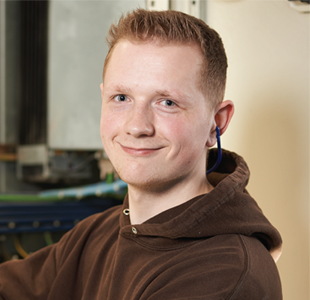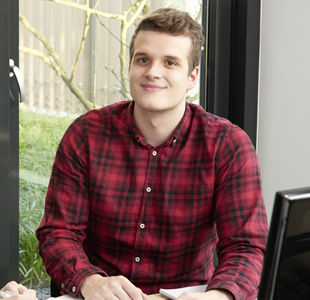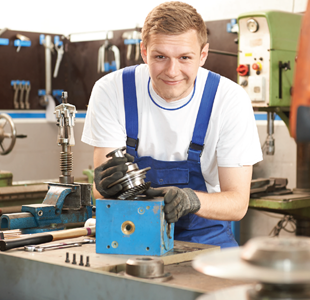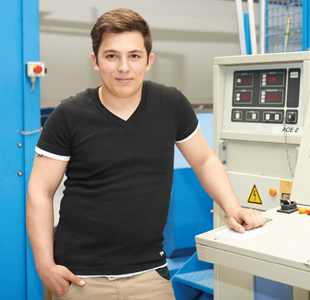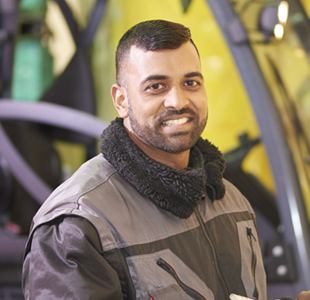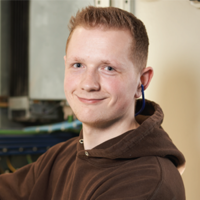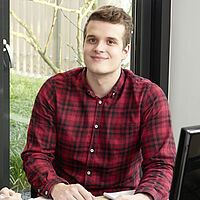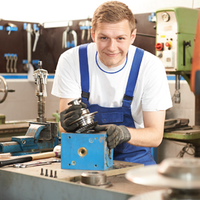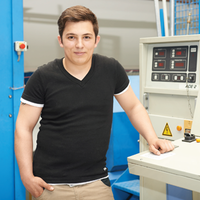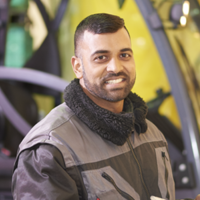What is a typical day like?
It depends whether I am on the early shift or the late shift. The early shift starts at 7.00am, and on the late shift I don't start until 10.00am. On the early shift, the first thing I do is run through the production and collect all the samples that were produced overnight. Then I use the various measurement tools to check that the particular customer's specifications have been met. I also constantly check the quality of the samples that come out of production and into the laboratory. I can choose when to take my lunch break some time between 12.00 and 2.00pm. I either go home, or I meet colleagues in the cafeteria.
What tasks do you carry out a lot? What tasks have you learned to do up until now?
I work with SAP a lot. This is where all the test reports and evaluations come together. Otherwise, I test the samples using the different measuring equipment, for example on the tensile strength and stretch machine, the thickness measure, the combustion chamber, the climatic chamber, and I conduct water absorption tests etc.
What other departments are you learning about during your training?
I spent two weeks working in production to get some insight into the work they do there, how the nonwovens machines work and what kind of faults occur.
Which vocational college do you attend? What is a typical day like at your vocational college?
I attend the textiles college in Münchberg, in Bavaria. There is a total of 12 weeks of teaching each year, in blocks of two to three weeks each. On the one hand, we learn about the theoretical background here, but we also do a lot of practical exercises at college every day. Overall, you learn about the tests that are carried out in the textiles industry and that you haven't yet covered in your work at the company. These examples constantly show what it is really is a big advantage to be able to attend this vocational college. Everything here is focused on textiles professions and textiles in general. During these block phase, I live in the 'AWO Wohnheim' student accommodation. Around 90 to 95% of the vocational students are housed there. I share a room with a fellow student.
Which subjects are you studying at vocational college?
My main subjects are Quality Assurance, Textiles Technology, Textiles Testing and Materials Analysis (Chemistry). My subsidiaries are subjects like German, English, Religion and Social Sciences.
What tips can you give applicants who are applying for this apprenticeship?
A fundamental interest in Chemistry is important of course, but you should also have an open attitude and an interest in other people and cultures, because TWE has customers all other the world that you need to communicate with.
How are you supported at TWE during your apprenticeship?
I am the first apprentice here at TWE to do this apprenticeship, so it was all new even for my colleagues in the laboratory at the beginning. But they all take good care of me. Everyone helps me if I have questions, or they explain things without being asked. Otherwise, I can always go the Quality Assurance department manager if I ever have particular issues or questions. If I have special requirements or suggestions for my training, he is also my first point of contact and supports me. All the trainees and our training managers also meet at regular intervals to air any requirements and/or issues that would otherwise be lost in the everyday work.
Do you have any plans once you complete your apprenticeship?
If it works out, I'd love to stay here and continue working in the laboratory. I would also like to continue my education, for example by training as an Engineer or by studying at the same time as working.
To what extent have you further developed on a personal level during your apprenticeship?
I have developed personally in many ways. For example, I have become a lot more open and willing to communicate. But I also notice that I have a much greater sense of responsibility and am far more self-confident. I have also become keener to learn, and I find learning easier. I hadn't expected that at the outset.
When you think back, what were your first days at TWE like?
This was a side job for me when I started, so I didn't have a 'typical' start to my training. But even as a side job, my experience was that everyone was nice and friendly, and I quickly became a part of the team.
What do you enjoy most about the work? What do you like best?
Generally speaking, I enjoy the work because it is very varied, and I am always learning something new. For example, I enjoy carrying out new, unusual tests where you really don't know in advance what the result will be. Apart from that, I particularly enjoy being able to work independently and taking personal responsibility, and my lovely colleagues.




